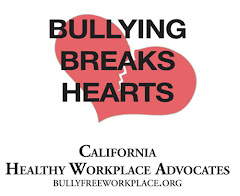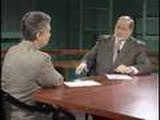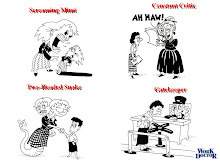Desk rage. Back-stabbing bosses. Sarcastic and inconsiderate co-workers. This is 9-to-5 reality for way too many people. You may have heard about a new, headline-making survey that says 43 percent of Americans have been targets of workplace incivility. It's easy to guess why: The shaky economy is ratcheting up workday stress for 70 percent of us.
Here are three great reasons you shouldn't put up with it:
1. It infects your home life. Rudeness has a ripple effect. You bring the bad vibes home, and things get tense there. The next day, your partner drags the ill will off to his or her workplace, triggering another outbreak of incivility.
2. It's a health threat. It's pretty easy to get sucked into a cycle of snarkiness, but it sure isn't good for you. Negativity and chronic stress boost your blood pressure and the threat of heart disease and lung problems. Being positive and polite does just the opposite.
3. It's bad for business. Managers and CEOs, listen up. Ignoring a nasty work environment (or contributing to it) costs you money. Workers who've been targets may not tell you so, but half of them waste work time dodging or worrying about the next "attack." One in five says they don't work as hard and one in 10 finds ways to spend less time on the job. Work stress costs the economy $300 billion a year, and plenty of it is "people stress."
If you're stuck in the kind of office that makes the Hatfields and McCoys look like kissing cousins, try these steps to help you rise above the ugliness and bring back respect:
Stage a one-person "good manners revolution." Good manners are a time-tested instruction manual for maintaining dignity and sanity. So respect others. Look for the best in people. Speak kindly. Bite your tongue when you're about to gossip or make a witty-yet-cruel remark about a co-worker. Really listen to colleagues. Do these things, and you'll also forge new connections and give your longevity a boost.
Outsmart the office jerk. Every water cooler has one: the complainer who always sees the dark side. Thanks to "mirror neurons" in our brains that mimic others, this can be contagious. Protect yourself by cutting him or her some slack (maybe there's a difficult situation at home). Consider changing your break time to avoid the verbal toxin. And think upbeat thoughts after a run-in.
Don't excuse it in yourself. Maybe you'd never send a nasty email, yell at a co-worker, take credit for others' work or snub a colleague in the cafeteria. But do you text during meetings? Take the last cup of coffee and not start a fresh pot? Walk away from a copier jam you caused? Snap at tech support because you're sooooo frustrated? Polish up your act.
Find an ally. If there's rampant incivility at work, talk with your boss or have a chat with human resources (especially if you're a target). Bring along this column. Business psychology experts emphasize that real change comes only from the top.
Find meaning in what you do. Work's not easy these days, but renewing your commitment to your job can help you shrug off the ill effects of incivility (and can make you nicer, too). Even if you have to dig, there's satisfaction somewhere in any job. Does it have a positive effect on others? Does it use at least some of your talents, or stretch them in new ways? Is it, even indirectly, helping you reach your purpose in life? And, yes, "purpose" includes earning enough money to raise a family. Or support a passion. Or do good elsewhere. Or retrain for a new job!
The YOU Docs, Mehmet Oz, host of "The Dr. Oz Show" and Mike Roizen of Cleveland Clinic, are authors of "YOU: Losing Weight." For more information go to www.RealAge.com
Here are three great reasons you shouldn't put up with it:
1. It infects your home life. Rudeness has a ripple effect. You bring the bad vibes home, and things get tense there. The next day, your partner drags the ill will off to his or her workplace, triggering another outbreak of incivility.
2. It's a health threat. It's pretty easy to get sucked into a cycle of snarkiness, but it sure isn't good for you. Negativity and chronic stress boost your blood pressure and the threat of heart disease and lung problems. Being positive and polite does just the opposite.
3. It's bad for business. Managers and CEOs, listen up. Ignoring a nasty work environment (or contributing to it) costs you money. Workers who've been targets may not tell you so, but half of them waste work time dodging or worrying about the next "attack." One in five says they don't work as hard and one in 10 finds ways to spend less time on the job. Work stress costs the economy $300 billion a year, and plenty of it is "people stress."
If you're stuck in the kind of office that makes the Hatfields and McCoys look like kissing cousins, try these steps to help you rise above the ugliness and bring back respect:
Stage a one-person "good manners revolution." Good manners are a time-tested instruction manual for maintaining dignity and sanity. So respect others. Look for the best in people. Speak kindly. Bite your tongue when you're about to gossip or make a witty-yet-cruel remark about a co-worker. Really listen to colleagues. Do these things, and you'll also forge new connections and give your longevity a boost.
Outsmart the office jerk. Every water cooler has one: the complainer who always sees the dark side. Thanks to "mirror neurons" in our brains that mimic others, this can be contagious. Protect yourself by cutting him or her some slack (maybe there's a difficult situation at home). Consider changing your break time to avoid the verbal toxin. And think upbeat thoughts after a run-in.
Don't excuse it in yourself. Maybe you'd never send a nasty email, yell at a co-worker, take credit for others' work or snub a colleague in the cafeteria. But do you text during meetings? Take the last cup of coffee and not start a fresh pot? Walk away from a copier jam you caused? Snap at tech support because you're sooooo frustrated? Polish up your act.
Find an ally. If there's rampant incivility at work, talk with your boss or have a chat with human resources (especially if you're a target). Bring along this column. Business psychology experts emphasize that real change comes only from the top.
Find meaning in what you do. Work's not easy these days, but renewing your commitment to your job can help you shrug off the ill effects of incivility (and can make you nicer, too). Even if you have to dig, there's satisfaction somewhere in any job. Does it have a positive effect on others? Does it use at least some of your talents, or stretch them in new ways? Is it, even indirectly, helping you reach your purpose in life? And, yes, "purpose" includes earning enough money to raise a family. Or support a passion. Or do good elsewhere. Or retrain for a new job!
The YOU Docs, Mehmet Oz, host of "The Dr. Oz Show" and Mike Roizen of Cleveland Clinic, are authors of "YOU: Losing Weight." For more information go to www.RealAge.com



























Here is much better info for those interested as well as those being targeted for bullying, this url, http://healthyworkplacebill.org and this url, http://www.workplacebullying.org. Both can help targets of bullying to learn from scholars, activists and other targets and victims about how to deal with this form of workplace bullying. I speak from experience and those of others.
ReplyDelete